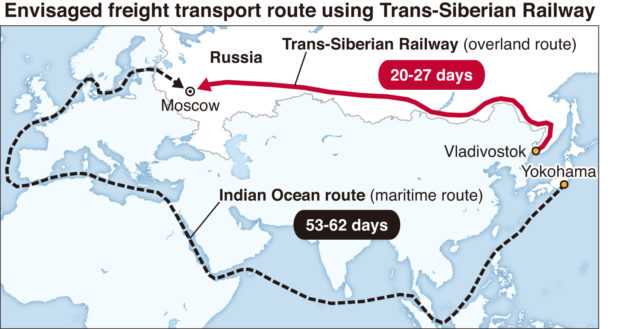Japan, Russia plan freight route via Trans-Siberian Railway

The Japan News/Asia News Network Photo
TOKYO — Japan and Russia plan to officially develop a freight transport route between the two countries via the Trans-Siberian Railway, it has been learned.
The two governments aim to foster mutual economic cooperation by energizing the “third distribution channel,” after sea and air routes.
The project is also motivated by a desire to build confidence between the two countries and thus pave the way for resolving territorial disputes.
According to a source knowledgeable about Japan-Russia diplomacy, a test to verify distribution using the Trans-Siberian Railway will start around Sept. 11-13, when the Eastern Economic Forum takes place in the Russian city of Vladivostok.
Prime Minister Shinzo Abe will attend the forum and is scheduled to meet with Russian President Vladimir Putin on the sidelines.
Five to 10 companies, mainly Japanese distribution firms, are considering participating in the test, which will study factors such as the cost and time of transportation, administrative procedures needed for customs, and import and export processes. Elements that could affect cargo, such as vibration during transport and differences in temperature, will also be examined. The government aims to work with the private sector in resolving possible problems involving the route.
The Trans-Siberian Railway is an about 9,300-kilometer railway that connects Moscow and Vladivostok with a travel time of seven days. Japan’s use of the railway for freight transport nosedived after the 1991 collapse of the Soviet Union. Recently, China and South Korea have been expanding their use of the route.
Current freight transport between Japan and Russia mainly uses sea and air routes. The overland route is rarely used, for reasons such as complicated procedures and a lack of information.
According to the Land, Infrastructure, Transport and Tourism Ministry, it takes between 53 and 62 days to transport freight from Japan to Moscow using a sea route that crosses the Indian Ocean. On the other hand, first moving freight from various ports in Japan to the Russian port city of Vladivostok, and then transporting it to Moscow via rail is expected to take 20 to 27 days, about half the time of the sea route. The costs could also be reduced by up to 40 percent.
Japan’s total export volume to Russia in 2017 was worth about ¥673.7 billion, with automobiles accounting for about 44 percent and auto parts for about 12 percent, according to Finance Ministry trade statistics. Meanwhile, the total import volume in 2017 was worth ¥1.5507 trillion, with crude oil and raw oil accounting for about 27 percent, liquefied natural gas for about 20 percent and coal about 15 percent.
Those involved in the railway transport project hope that improved efficiency will lead to more exports of auto parts and other industrial products. It is technically possible to transport crude oil and natural gas by the railway too, sources said.
There is an idea to expand the route to Europe via Moscow. If realized, the Trans-Siberian Railway could become a pivotal path that also underpins trade between Japan and Europe.
“If economic ties between Japan and Russia are reinforced through an invigoration of transport links, we can expect a positive impact on resolving the northern territories issue,” a Japanese government source said.














